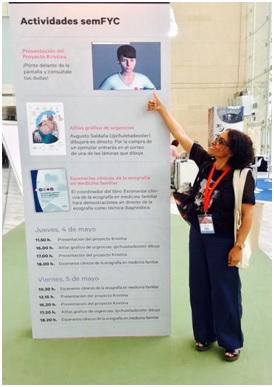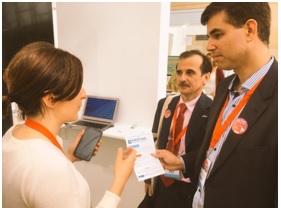A better health assistance for migrants: family doctors will help us to evaluate the KRISTINA prototype

Family medicine needs to be supported. Now, more than ever, communication technologies will help family doctors to improve their work especially when necessary to overcome linguistic barriers in order to ensure an effective and accurate assistance. The European Funded Project KRISTINA will develop and present a virtual assistant in the field of healthcare that will enable getting over language barriers when dealing with users and, therefore, its priority application will be to attend migrants who are struggling to overcome linguistic barriers. With the first prototype, KRISTINA becomes a conversation partner and during the last XXXVII semFYC National Congress it has been presented to Spanish health professionals. We really appreciated their interest and their support in the development of this European project.
Migration flows are increasing: national and European policies need to be implemented taking into account different perspectives. Family doctors are the main relevant stakeholders to be involved being aware of the innovative technologies to be potentially applied. Among the participants, we met different representatives from World Organization of Family Doctors (WONCA). Reforming health service delivery for universal health coverage is one of the main objective of the World Health Organization and according to the last statistical data 400 million people lack access to essential health services that could be delivered through primary care and globally, up to 40% of all health care spending is wasted through inefficiency. Migrants are mainly affected due to the limited access to the health care system and their difficulties to explain their cultural habits or routines.
The main points stressed during the semFYC National Congress were the following: lack of preventive care for migrants, cost-effective consequences related to a delayed assistance, obstacles to health care assistance when it is not possible to understand the patient, Technological limitation using digital services, authentication of reliable apps and web sources. These main topics have been discussed during the event together with Dr.Thiago Trindade (Presidente de la Sociedade Brasileira de Medicina de Família e Comunidade, SBMFC), Dr Ana Nunez Barata (Young Doctor Representative on the WONCA World Executive from November 2016 -2018 and member of the executive board of the Portuguese Association of Family Medicine ) and Dr. Lehdía Mohamed Dafa (Family Doctor and member of the somamFYC Working Group on Third World Countries).
Family doctors explicitly mentioned their need to ensure a preventive care for all migrants, especially because this aspect is often underestimated by these patients. People coming from different regions and areas out of Europe could refuse the assistance where symptoms are not evident or when they are not associated to evident illness. On the other hand, from the migrant’s perspective, European healthcare systems are complex and sometimes the administrative procedures seem insuperable obstacles. The result is the ineffective or delayed assistance with worsening situations requiring an immediate intervention.
Health professionals taking part to the semFYC national Congress, also stressed the cost-effective consequences related to a delayed assistance. Patients receiving a deferred assistance could receive emergency treatments, which are more expensive and difficult to obtain within the National Health Systems. It is clear and also demonstrated by statistical data that our health administration is facing a decreasing efficiency: according to the study published by the DG for Economic and Financial Affairs (2015) the expenses made by governments are not directly proportional to the health outcomes among the general population. The initial plan for innovation and exploitation submitted by semFYC within the framework of the KRISTINA project highlighted that the recent migration flows are a key factor to be considered by our governments, due to their influence on the mentioned trends.

Fruitful discussions and concerns have been shared and during the presentation they contributed with fruitful inputs. One of the main concerns is the importance of communicative technologies able to ensure and improve the user experience. Migrants needs to understand the administrative procedures by using their native language. Clear messages, centralized identification of reliable sources and intuitive interaction with graphical user interfaces are the key points to be ensured. Future health systems will be based on interoperability and easy access to health information. The semFYC National Congress has identified these key points to avoid the technological limitation using the health digital services. On the other hand, we should also stress that more and more patients expect to use digital services in the future. The rejection coming from a part of the population is mostly based on the dissatisfaction with the existing services and with the scattering health sources, difficult to find, to interpret and to be identified as reliable information.
More information day will be promoted and organized by semFYC in different health centers and hospital all over Spain. Family Doctors will help us to evaluate the prototype. Since November 2016 KRISTINA can be effectively considered a virtual agent with a proper voice and aspect. The first prototype has been presented as a human interface able to talk and interact with users but still with limited functionalities. General Practitioners are invited to participate and to take part to our upcoming events promoted through the website of the project kristina-project.eu, providing their feedback and experience. We are going to build a user centric system based on the user's expectations: we believe in a public consultation in order to obtain better results.
If you are interested in joining the KRISTINA User Group, please contact with
[email protected] or follow the project on our social media channels Twitter, Facebook and LinkedIn.
Research will meet Primary Healthcare expectations!
Follow the project on
Twitter: https://twitter.com/projectKRISTINA
Facebook: https://www.facebook.com/projectKRISTINa
LinkedIn: https://www.linkedin.com/groups/12003450